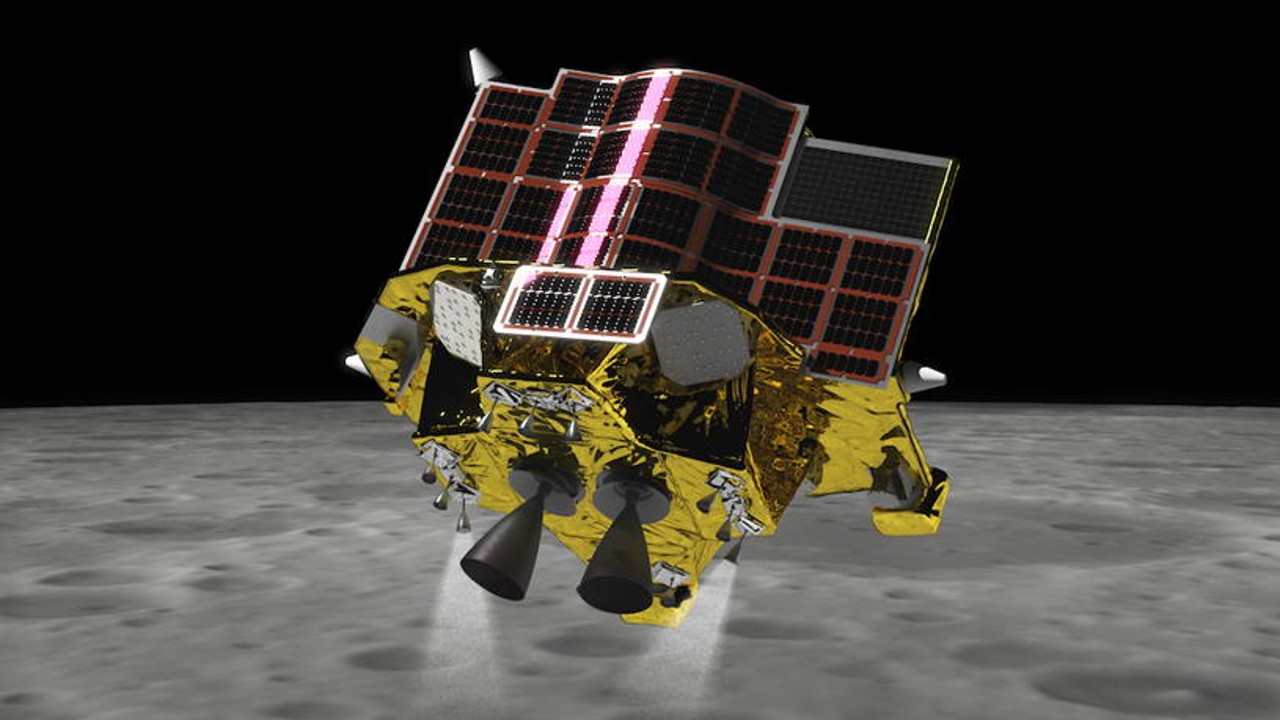
A Japanese spacecraft just took a huge step toward pulling off the nation's first-ever moon landing.
Japan's robotic SLIM moon lander arrived in lunar orbit on Christmas Day (Dec. 25) as planned, the Japan Aerospace Exploration Agency announced. The spacecraft entered lunar orbit at 2:51 a.m. EDT (4:51 p.m. Japan Standard Time, 0751 GMT).
"The Japan Aerospace Exploration Agency (JAXA) is pleased to announce that the Smart Lander for Investigating Moon (SLIM) was successfully inserted into lunar orbit at 16:51 (Japan Standard Time, JST) on December 25, 2023," JAXA officials wrote in an update. The spacecraft is in an elliptical orbit that takes 6.4 hours to circle the moon, coming within 373 miles (600 kilometers) of the lunar surface at its closest point and reaching out to 2,485 miles (4,000 km) at its farthest.
The milestone keeps SLIM on target to attempt a lunar touchdown on Jan. 19. Success in that endeavor would be historic; to date, only four nations — the Soviet Union, the U.S., China and India — have soft-landed a craft on the moon.
Related: Missions to the moon: Past, present and future
The 8.8-foot-long (2.7 meters) SLIM launched on Sept. 6 along with XRISM, a powerful X-ray space telescope.
Both Japanese spacecraft deployed into Earth orbit, and XRISM remains there today. But SLIM left our planet's gravity well on Sept. 30, beginning a long, circuitous and energy-efficient route to the moon.
Get the Space.com Newsletter
Breaking space news, the latest updates on rocket launches, skywatching events and more!
That trek came to an end today, when SLIM inserted itself itself into lunar orbit. The probe will now start gearing up for its touchdown attempt, during which it will try to live up to its "Moon Sniper" nickname: SLIM aims to hit its landing-zone target with an accuracy of 330 feet (100 m) or less, paving the way for even more ambitious exploration efforts down the road.
SLIM "is a mission for researching the pinpoint landing technology necessary for future lunar probes and verifying this on the surface of the moon with a small-scale probe," JAXA officials wrote in a mission description.
"By creating the SLIM lander, humans will make a qualitative shift towards being able to land where we want and not just where it is easy to land, as had been the case before," they added. "By achieving this, it will become possible to land on planets even more resource-scarce than the moon."
If all goes according to plan, SLIM will also deploy two miniprobes onto the lunar surface after touching down. These daughter craft will snap photos, help mission team members monitor SLIM's status and provide an "independent communication system for direct communication with Earth," JAXA officials wrote in the SLIM mission's press kit.
SLIM isn't the first Japanese spacecraft to reach lunar orbit; the Hiten probe did so in 1990, followed by SELENE ("Selenological and Engineering Explorer"), also known as Kaguya, in 2007.
And Hakuto-R, a lander built by Tokyo-based company ispace, arrived in lunar orbit this past March. Hakuto-R tried to touch down on the moon a month later but crashed after its sensors got confused by the rim of a lunar crater.
Join our Space Forums to keep talking space on the latest missions, night sky and more! And if you have a news tip, correction or comment, let us know at: community@space.com.

Michael Wall is a Senior Space Writer with Space.com and joined the team in 2010. He primarily covers exoplanets, spaceflight and military space, but has been known to dabble in the space art beat. His book about the search for alien life, "Out There," was published on Nov. 13, 2018. Before becoming a science writer, Michael worked as a herpetologist and wildlife biologist. He has a Ph.D. in evolutionary biology from the University of Sydney, Australia, a bachelor's degree from the University of Arizona, and a graduate certificate in science writing from the University of California, Santa Cruz. To find out what his latest project is, you can follow Michael on Twitter.









